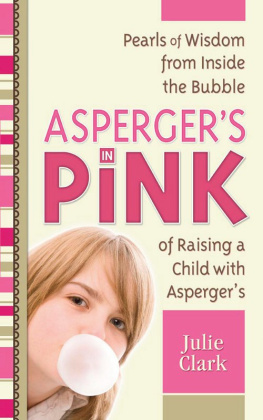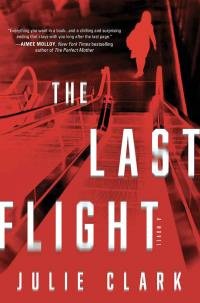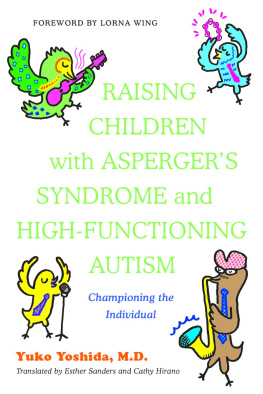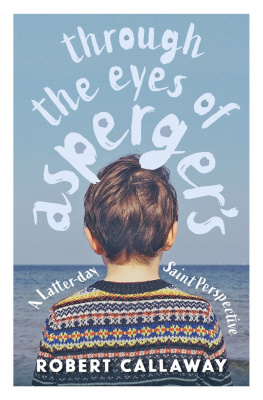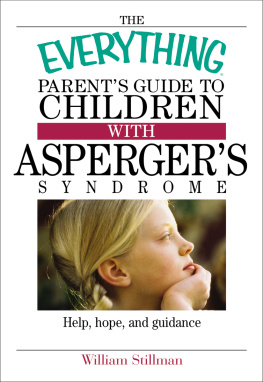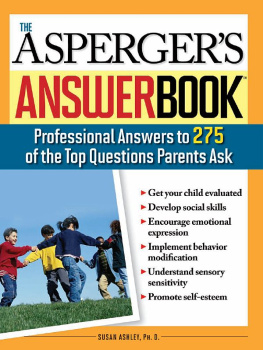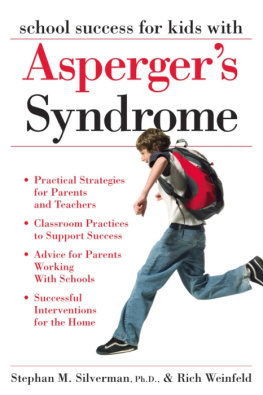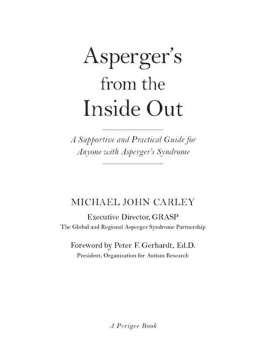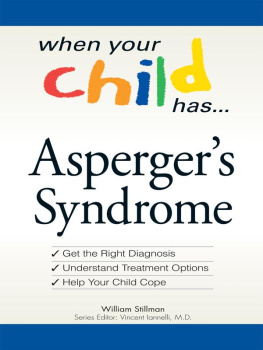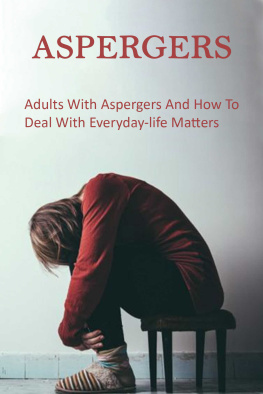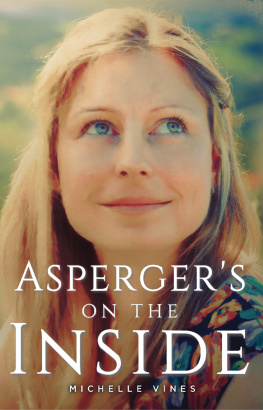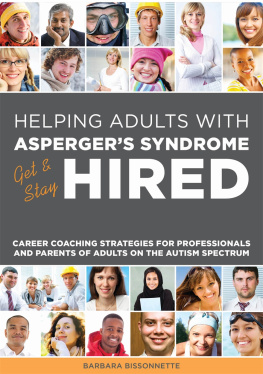
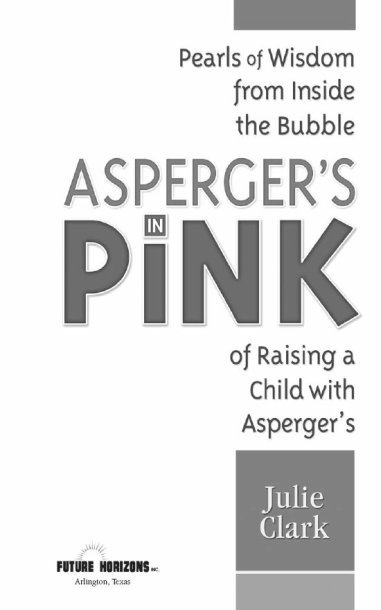
ASPERGERS IN PINK
All marketing and publishing rights guaranteed to and reserved by:

721 W. Abram Street
Arlington, Texas 76013
800-489-0727
817-277-0727
817-277-2270 (fax)
E-MAIL:
www.FHautism.com
2010 Julie Clark
Book design TLC Graphics, www.TLCGraphics.com
Cover by: Monica Thomas; Interior by: Erin Stark
All rights reserved.
No part of this book may be reproduced in any manner whatsoever without written permission of Future Horizons, Inc., except in the case of brief quotations embodied in reviews.
ISBN for E-book Version: 978-1-935274-29-2
ISBN for Print Version: 978-1-935274-10-0
For my amazing, beautiful daughter, and her father, my husband and teammate

Acknowledgments
Recently, I thanked a friend for her support along the way, and she quickly dismissed it, thinking it didnt amount to much. But kind words do add up, and every person who has uttered even a few words of encouragement along this journey is forever imprinted on my heart. Thank you.
First and foremost, unending thanks goes out to Wayne Gilpin, along with everyone at Future Horizons, for taking on our story, and being so wonderful to work with! I cant say enough, and am forever grateful. A special note of thanks goes to my editor, Kelly Gilpin. Thanks for everything just doesnt seem to cut it.
Thanks to Ellen Notbohm, for a timely boost of courage with a side of wisdom every young author needs. Thanks to Rudy Simone, for her uplifting words to me, and for writing the foreword. Much appreciation goes to Dr. Cara Regan, who has provided wisdom and support. A condensed thanks goes to Kim Casey, whose gentle pushes of encouragement throughout the decades continue to provide me with confidence to be true to who I am. And to Sally, whose friendship I will always, always treasure.
Id also like to take a moment to express appreciation for experts in the field, such as Dr. Tony Attwood, whose work continues to help families like ours. Likewise, helpful online sources, such as the Bridge newsletter (a publication of the Advocacy Center).
Endless gratitude goes to my husband, who is a large force behind Aspergers in Pink. I could not have written this without his support. And to my daughter, the best daughter anyone could ask for, who has permitted me to share a glimpse into her world with the world. I dont know what I would do without her.
Kristina would like to thank all of her friends who support her for who she is and what is within her, without judging her, and she would especially like to thank her first ever real best friend. Thank you.
Foreword
She doesnt seem autistic to me, is a statement that Julie Clark hears again and again when she tells people her daughter has Aspergers Syndrome. I didnt know girls could have it or she sounds just like my kid, are other common responses. This skepticism even occurs after a positive, professional diagnosis. Ironically, one of the biggest challenges in being high-functioning lies in convincing others we have challenges. Most people dont realize that autism is a not only a long spectrum but also a wide one, and different people sit on different parts of that landscape. Shes not autistic; shes spoiled, Julie also hears, a mild cousin of the refrigerator mother theory of autism. Even the best parents can be accused of being part of the problem rather than the solution. Even the most well-meaning individuals may dispute a diagnosis of AS, in an effort to simplify or normalize the situation.
There is a mindset that naming something will give it more power. Naming is a powerful thingAspergers Syndrome aligns us with a group, it gives us a backdrop and a catalog of information. So many AS females dont have the name; Aspergers manifests differently in girls, often resulting in multiple misdiagnoses and not having access to the proper care and support. Diagnosis is the beginning of a labyrinthine, bureaucratic but sometimes very effective system of support for a child. Without diagnosis, girls are left with the wondering and the questions. They dont have the subculture to turn to for answers and support. In short, they struggle.
Kristina, the real life star of Aspergers in Pink, is a little girl who has to contend with many struggles but is too young to know it yet. She doesnt understand that other children dont have the same perspectives, the same talents and the same sensitivities. Or if she does see it, she thinks it is because she is gifted and they are not. In many ways she is right, but to be intellectually gifted is often to be emotionally, socially, and sensorially challenged. Often the drawbacks for an AS girl only become painfully obvious when she hits adolescence or puberty. When her childhood friends, if she had any, may begin to distance themselves from her quirks and align themselves with other, less awkward, more popular girls. This is when the person with Aspergers begins to realize the downside of different, when to be different almost guarantees isolation and bullying.
Those involved in the life of a young child need full understanding of Aspergers so the child isnt blamed for their behavior, resulting in guilt and confusion. These can lead to lifelong depression and anxiety, which may, in the case of older girls looking for diagnosis, throw counselors and psychologists completely off the trail of AS, causing them to treat the symptoms rather than identify the source. Kristinas mother Julie knows this and does her best to stay one step ahead of the game. Battling apathy, ignorance, and indifference, she tries to pull everyone else in her daughters world up to speed. Like the mothers of some of our more well-known Aspergirls, such as Temple Grandin and Liane Holliday Willey, Julie is a mother who knows, and always knew, that her child is super special, that she is worth taking the time for. She fights daily so her daughter doesnt have to, so that the weight of being different doesnt cause her daughter to lose the spring in her step. Not all girls with Aspergers are so lucky. Many have had parents who did not have the ability, the wherewithal, the education, or the patience to understand their child. Some had children on the spectrum before the diagnosis existed. Julie Clark took the time to investigate Aspergers Syndrome with the tenacity of a detective on the trail. She followed the clues, she enlisted the aid of professionals, and then she diligently monitored the progress of her daughters education and care. She wanted to trust other people to have her daughters best interest at heart, but unfortunately some people who are entrusted to sculpt an inclusive, enlightened world for our kids sometimes find it easier to leave the odd ones out of the reindeer games. Julie also eloquently illustrates how just one caring, thoughtful, engaged soul can make a vast world of difference in a childs life and the lives of her family.
Next page
